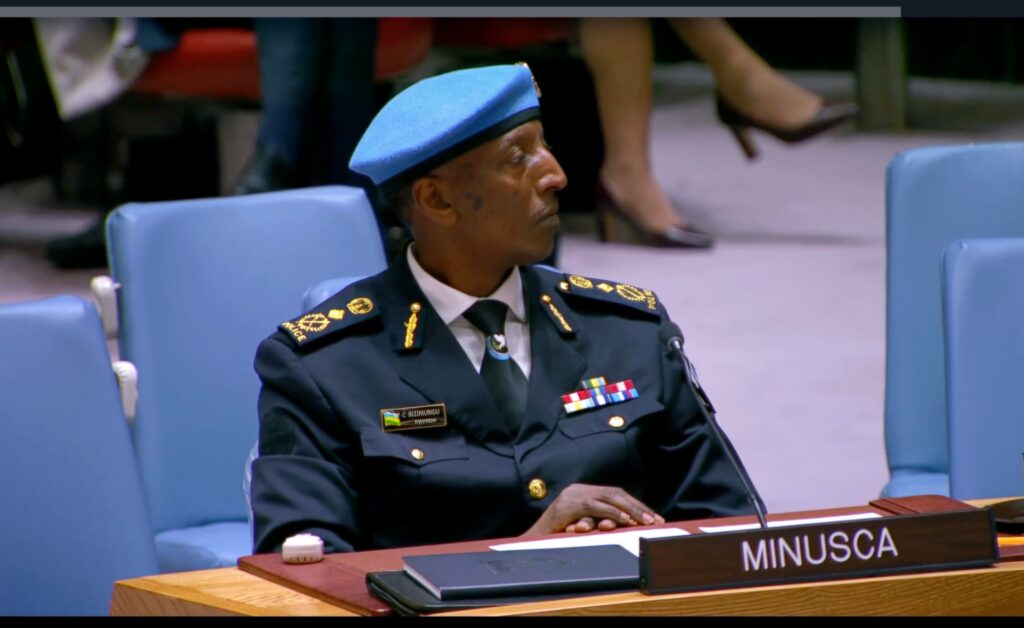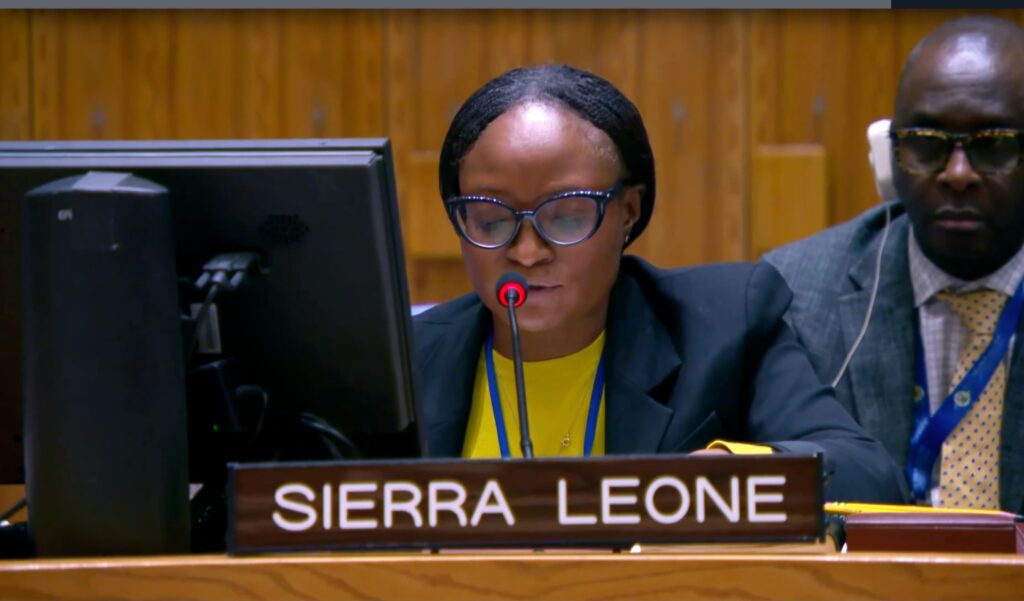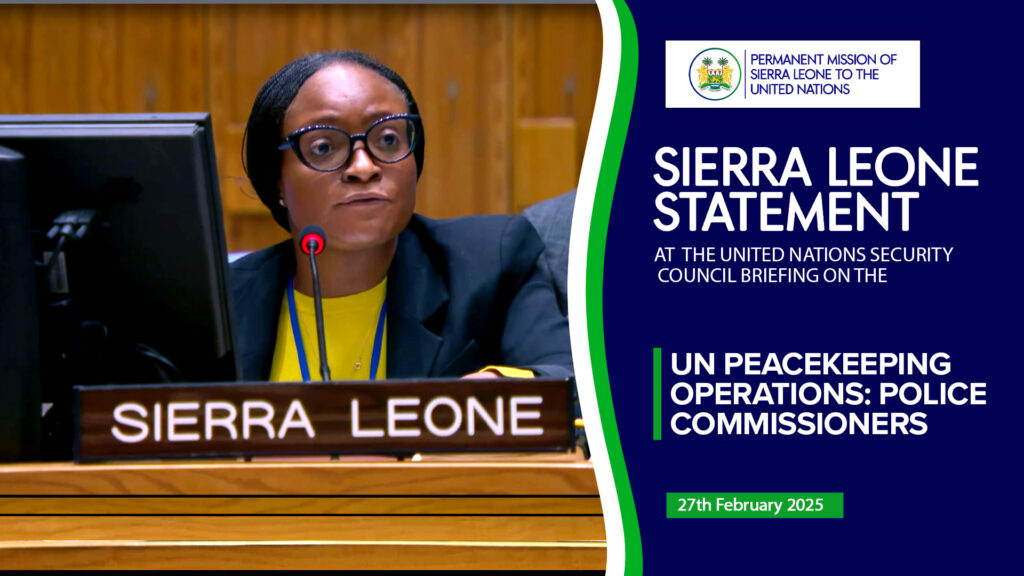STATEMENT:
MS. SONIA KARIM
MINISTER COUNSELLOR & DEPUTY POLITICAL COORDINATOR
Thank you, Mr. President,
I thank Under Secretary-General Jean-Pierre Lacroix, UN Police Adviser Mr. Faisal Shahkar, Police Commissioner Mr. Christophe Bizimungu, and Senior Police Adviser Ms. Mingzhu Xu for their informative briefings.
UN Police operations remain integral to the achievement of global peace and security, as we promote peace processes that seek to address the root causes of conflicts; include meaningful participation of local stakeholders including women, youth, civil society and community leaders; and support national cohesion and state building. UN Police, once tasked to monitor and report, are now expected to actively solve problems and address public security, often substituting for local police or rebuilding/ restructuring entire security organizations. In prioritizing multilateral approaches to addressing conflicts, with political dialogue and engagements at the center, the Security Council must thus provide UN police operations with the appropriate administrative, technical and logistical capacities to effectively contribute to this agenda.
The scale and scope of UN police peace operations has evolved and grown to effectively address the protection of civilians in its various dimensions. UN police currently deployed in UN peacekeeping missions perform a wide variety of functions that reflect the complexities and multidimensional nature of conflicts, ranging from protecting civilians from harm and investigating incidents of sexual and gender-based violence, to securing elections, helping to build and improve local justice and security mechanisms, and fighting transnational organized crime and violent extremism, alongside their host-state counterparts.
Mr. President,
To strengthen their efficiency, UN Police operations must be guided by clear mandates guiding their operations. Whether deployed in multidimensional peace operations or in the context of targeted mandates, these deployments must be underpinned by clear objectives based on accurate assessments of the conditions on the ground, as well as the end goals to be achieved through a coherent legitimate peace process and beyond. UN police operations are not ends unto themselves but must rather function as a diplomatic tool to maintain or create the stable conditions necessary for safeguarding ongoing peace processes and stabilization. Configuring peacekeeping operations to meet the challenges of today and tomorrow must therefore always be based on adherence to the principles of the UN Charter and to upholding human rights.
In developing a clear mandate for UN Police operations, there should be clarity and agreement amongst the key stakeholders, including the Security Council, PCCs, and host nations, with regards the viability of the approach. Coordination between the Security Council and the General Assembly, as well as with UN agencies and other development agencies, is needed to develop strategies that move beyond peacekeeping during conflict, to supporting states during reconstruction and state building. At the operational level, it is equally important that local communities trust the presence and work of UN Police, and regard them as a useful force for good, particularly in the case of communities dealing with trauma from protracted conflict and violations of human rights.
The expansion of demand for UN Police operations in addressing complex challenges in an age of technology-driven warfare, extremism and transborder crimes requires specialized skills and training. Measures undertaken by UN Police to improve their management and operations including through the Strategic Guidance Framework (SGF) for International Police Peacekeeping (SGF), as well as initiatives such as the Secretary-General’s Action for Peacekeeping + (A4P+), provide a cohesive and coherent framework for the recruitment, training and deployment of an agile and capable UN Police force that can respond to the needs of communities. Efforts have increased to build capacities in languages, strategic leadership, community policing, and protection of civilians. UN Police operations can be further enhanced by using reliable data on conflict/fragile situations and socio-economic conditions to conduct hotspot analysis and predictive policing, noting adherence to ethical standards in this regard.
We particularly commend concerted efforts of UN Police operations in responding to the women peace and security agenda, not only with respect to their human resource policies, but also with numerous examples from missions of proactive measures for addressing gender-based violence, women’s capacity building and education, as well as female participation in governance and community peace.
Further noting the positive multiplier effects emanating from efforts to build and strengthen national security and governance institutions, in many peace keeping operations in Africa and elsewhere, we call on Member States to increase their support of capacity building initiatives for UN police forces and logistical support to ensure their preparedness and effectiveness in missions.
Looking ahead, UN Police peace operations will require more strategic partnerships with regional actors in shifting towards flexible operations that can better address the challenges of a shifting geopolitical landscape and resource constraints. The range of possible adaptive configurations will be demonstrated to some extent as we implement Resolution 2719, which presents an opportunity for supporting fixed police units that can be readily deployed to support peace operations on the African continent.
In conclusion Mr. President, strengthening good governance and protection of civilians in the context of conflict prevention and peacebuilding cooperation, also requires the Security Council and member states to explore more strategic interactions with entities such as the Peacebuilding Commission which, if fully utilized, can effectively bridge the peace-development nexus and support durable peace and security arrangements. We welcome the assurances for adequate, predictable and sustainable financing for peace operations provided in the Pact for the Future.
I thank you.





